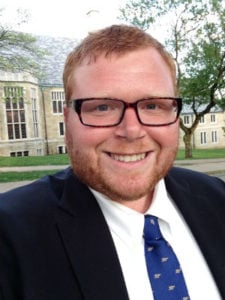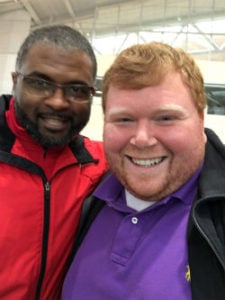 Scott Gill-Jacobson had a question he needed answered.
Scott Gill-Jacobson had a question he needed answered.
During his time as assistant director of accountability, education and compliance at Florida Southern College, Gill-Jacobson became aware of a strange phenomenon in the world of student affairs.
“People talk about how half of student affairs professionals will leave their profession within five years,” he said. “It’s almost talked about sometimes as though it’s a looming thing. It’s not necessarily meant to scare people, but you wonder, will it be you? Will it be someone else?”
Gill-Jacobson decided to figure out why young student affairs professionals are leaving the field when he started work on his dissertation for the Doctor of Education in Educational Leadership online program at St. Thomas University.
“Once I started to dig into it to see if there was enough to build a dissertation off of, I realized quickly that this has been an issue for the last four years,” he explained. “There’s only been a little bit written about it, but a lot of it is just talk about the phenomenon itself, not the reasons behind it or even what is perpetuating it.”
Gill-Jacobson is only in the first chapter of his research, but he is determined to get to the root of the issue by the time he finishes later this year and returns to work in higher education administration.
“If you want to get to the upper level positions, you definitely have to have a doctorate,” he said. “I would also like to start trying to teach some higher ed classes eventually or some doctoral-level classes around organizational leadership.”
With a solid footing halfway through the program, Gill-Jacobson knows that he has found the right program to reach his career goals.
“I really appreciate the degree in leadership because it gives you all the foundation you need to be successful,” he said. “It is obvious there is going to be a lot of practical applications to what we are working on.”
Looking Back
 Gill-Jacobson knew that he wanted to take classes online, and when he saw how affordable St. Thomas University’s program was for its high-quality education, he couldn’t say no.
Gill-Jacobson knew that he wanted to take classes online, and when he saw how affordable St. Thomas University’s program was for its high-quality education, he couldn’t say no.
“It also doesn’t hurt that it’s a Catholic institution,” he said. “I went to Catholic school when I was young, so there’s a certain familiarity there that’s comforting.”
The association helped ease Gill-Jacobson’s trepidation about returning to school eight years after receiving his master’s degree.
“The thing that I was concerned about the most was whether I was going to be able to hack it,” he remembered. “I wondered if those academic skills were going to come back to me, and the answer is yes. In my first couple classes, I was a ball of nerves and concerned that I was not hitting the mark. Then I realized that, yes, I was prepared.”
He started hitting his stride when he was able to connect education from his past to what he is learning now.
“When I was an undergrad, I only took one class in philosophy and it was on ethics, and believe it or not, that is probably the one class that I have found myself engaged with throughout my professional career,” he said. “When we had a full class on ethics in leadership [ELI 807: Ethics and Governance], it was wonderful to not only pull out my old undergrad books again, but to delve deeper into those questions.”
What Gill-Jacobson appreciated about taking a closer look at philosophical problems was the opportunity to see the issues from multiple perspectives.
“We talked about globalization through media,” he said. “It’s interesting to apply ethical questions to what’s happening today in higher ed and in a business’s cutting-edge practices.”
It was more than just expanding his mind that appealed to Gill-Jacobson. The program has also given him a real sense of developing his career potential.
Looking Forward
Gill-Jacobson has gained a better perspective on his past, present and future since the very beginning of the program.
“One of my biggest takeaways from Leading a Learning Organization [ELI 813] was how to look at an organization from a system perspective and understand it as a living organism,” he explained. “That has directed how I think about my degree and the coursework that I’m doing. It has helped me to reflect on my professional experience.”
In light of this new understanding, Gill-Jacobson has a different perspective on handling difficult situations in the future.
“There are those times when you run into frustrations at any job when you’re banging your head against the wall when there isn’t anything you personally can change,” he said. “Instead, we need to look a little bit higher and get more stakeholders on our side when we are trying to change something.”
Gill-Jacobson views the program as being relevant and applicable to a number of career paths in addition to his own.
“The program has a very strong and structured focus on leadership, which you are able to apply to education, like myself, or public health, like some of my colleagues,” he said. “It is also ideal for teachers who are looking to move into administration positions.”
Thanks to the program’s forward-looking curriculum, Gill-Jacobson feels he will be ready to face the higher education challenges of not only today but also tomorrow.
“I’ve had a great opportunity to do a lot of research into different aspects of current events in higher education,” he said. “It’s been great to be able to take what it is we’re doing in class, and not only learn from that, but to really delve into issues like single-gender organizations like fraternities and medical marijuana on campus that are either current in higher ed or issues that are upcoming as well.”
Learn more about the St. Thomas University online Ed.D. in Educational Leadership program.